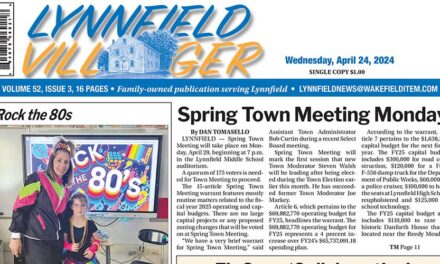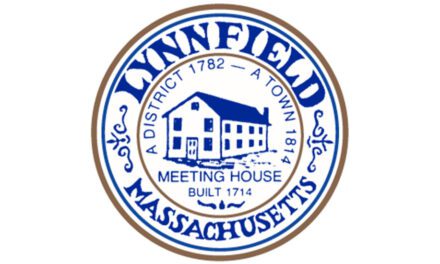Published December 26, 2018
By DAN TOMASELLO
LYNNFIELD — There is no end in sight for the ongoing 74 Crescent Ave. saga.
The Zoning Board of Appeals heard two cases pertaining to the home on Dec. 18. The first case was an appeal by abutters Barbara Dunn and Peter Recka of 78 Crescent Ave., who appealed Building Inspector John Roberto’s decision to issue a temporary occupancy permit to Norman and Erin Winsor. The second case involved the Winsors’ request for a modification of a prior Special Permit.
Dunn and Recka’s attorney, Bill Heney, said he told the ZBA at its Sept. 11 meeting that, “The board should not issue a temporary occupancy permit to the Winsor family.”
“We did not prevail and the board issued an order allowing the building inspector to issue a temporary building permit,” Heney said, adding, “The building inspector then issued that permit on Oct. 10. We then filed an appeal of that decision because we feel the building inspector was not properly authorized and did not read the file properly to issue that temporary permit.”
Heney said the Assessing Department, Board of Health, Conservation Commission and the Department of Public Works did not sign off on the Winsors’ permit. Therefore, he said, it should have never been issued.
In response to a question from ZBA member Anthony Moccia, Heney said Dunn and Recka have also appealed the ZBA’s decision to the Land Court.
“We have had our case management conference with the judge, and that is stayed pending the results we get here in town,” said Heney. “The appeal for your decision is not here tonight. It’s in the Land Court,” he told the board. “You authorized the building inspector to authorize the temporary certificate of occupancy given certain criteria. Our position is the building inspector did not get that criteria. It was not signed off by all the town officials.”
Heney also argued that the permit should have been denied because the Winsors did not submit a request for a temporary occupancy permit in writing.
“It is prejudicial allowing these people to live there,” said Heney. “It was noted when we were here before that it was a 90-day temporary occupancy, which will be coming up very shortly. It will be prejudicial having a family living there and trying to enforce the Zoning Bylaw when a Special Permit is being applied for after they built the home and moved in.”
Heney also stated his clients believe the Zoning Bylaw prohibits Roberto or the ZBA from issuing temporary occupancy permits.
“It’s a week before Christmas and it’s tough to stand here and ask you to have a family move out,” said Heney. “But you also have people who have not followed the rules and my clients have not been afforded the protection of the Zoning Bylaw.”
ZBA Chairman Brian Shaffer noted he discussed the Board of Health sign-off issue with Roberto.
According to Shaffer, Roberto had told him: “It is not standard operating procedure to have the Board of Health sign off on septic systems, although he did check with them and did verify that it is fully functioning. It was not an issue of operation and safety. The Board of Health had a question about the system’s location.”
Heney argued the Winsors need a variance for the home’s septic system and said the Board of Health should have a hearing on the matter. He said Dunn and Recka would attend the Board of Health meeting to state their opposition to the variance.
Attorney Brian McGrail, who is representing the Winsors, disagreed with Heney’s assertion that the Assessing Department, Conservation Commission and DPW need to sign off on the temporary occupancy permit.
“I have been practicing law for 28 years and I have never seen assessors sign off on an occupancy permit,” said McGrail. “I don’t know what the DPW would sign off on. The board is aware that very often you will have certificates of occupancy issued before certificates of compliance or orders of condition are issued by the Conservation Commission. Those don’t have anything to do with certificates of occupancy.”
McGrail said the Winsors met with Roberto and gave him a check for the permit.
“That is all he wanted,” said McGrail. “He did not want anything else. He seemed to be satisfied with what was filed.”
McGrail also disagreed with Heney’s assertion that the Zoning Bylaw prohibits temporary occupancy permits from being issued.
“What the bylaw says under Section 10.1.2 is ‘no building erected, altered, or in any way changed as to construction or use, under a permit or otherwise, shall be occupied or used without an occupancy permit.’ It doesn’t classify occupancy permit,” McGrail stated.
McGrail also noted Section 3.3 of the Zoning Bylaw allows the ZBA to “authorize a temporary building, structure or use not in conformity with the provisions of the bylaw, if necessary and incidental to the development of a permitted use.”
“That is what we are trying to do,” said McGrail. “There is specific authority in the bylaw to allow this.”
McGrail disagreed with Heney’s argument that the Winsors need a variance for the home’s septic system.
In closing, McGrail urged the ZBA to deny Dunn and Recka’s appeal.
Shaffer asked ZBA secretary Winnie Barrasso about the methodology Roberto uses when issuing building permits.
“The only signatures that get signed off on the building permit are plumbing, gas, electrical and the building inspector,” said Barrasso. “The DPW and Conservation never sign a building permit.”
Moccia and Shaffer both said the town should start requiring written requests for occupancy permits. However, Shaffer disagreed with Heney’s argument that the temporary occupancy permit should be revoked.
“My feeling is we would not overturn the decision of the building inspector,” said Shaffer. “But again, I am not prejudiced on making a final decision on whether a permanent occupancy permit should be issued.”
After the discussion, the ZBA voted 3-0 to deny Dunn and Recka’s appeal. The decisions of the Zoning Board must be unanimous. It was not known at press time whether Dunn and Recka would appeal this decision.
Second case continued
The ZBA continued the second case pertaining to the Winsors’ request for a modification to a prior Special Permit.
After Nitsch Engineering Vice President/Director of Land Surveying Denis Senguin finished giving an overview of the latest survey for 74 Crescent Ave., the ZBA requested that Town Counsel Tom Mullen weigh-in on the case.
The board also requested that Senguin, and John Noonan, who is the surveyor for Dunn and Recka, meet to discuss their differences.
The 74 Crescent Ave. case will be discussed at the board’s next meeting on Tuesday, Feb. 5.
“The basic problem in front of us is we have not received a plan that both of you agree upon,” said Shaffer. “And no one can make a decision until we get a plan that everyone agrees upon. The temporary occupancy permit was a bridge until we get that agreed upon plan, and then we can make that decision.”
Norm Winsor asked the board if he would be able to renew the temporary occupancy permit in January. Shaffer, the board chairman, said yes.




